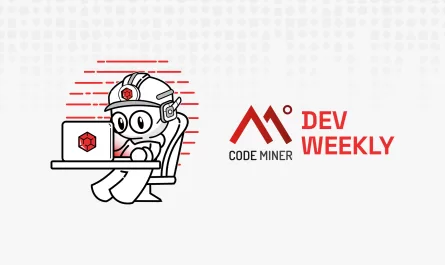HELLO EVERYONE!!! It’s June 20th, 2025 and you are reading the 66th edition of the Codeminer42’s tech news report. Let’s check out what the tech world showed us this week!
JSON module scripts are now Baseline Newly available – by Thomas Steiner
JSON module scripts are now widely supported, enabling modular data imports in JavaScript. This enhances code organization and reusability in web development. Thomas Steiner highlights their integration with modern frameworks. Browser compatibility ensures seamless adoption across platforms. This marks a significant step in web standards.
The State of Engineering Leadership in 2025 – Gregor Ojstersek
Engineering leadership in 2025 demands a balance of technical expertise and human-centric skills. Leaders must foster collaboration, embrace AI-driven tools, and prioritize team well-being. Remote work and hybrid models require adaptive management strategies. Continuous learning and inclusivity are critical for success. The role evolves to navigate complexity while driving innovation.
From Boilerplate Fatigue to Pragmatic Simplicity: My Experience Discovering Javalin – David Grajales
David Grajales shares his journey from complex Java frameworks to Javalin’s lightweight simplicity. Javalin reduces boilerplate code, enhancing developer productivity. Its intuitive API supports rapid web application development. The framework’s flexibility suits both small and large projects.
Secondary Indexes and the Specialized Storage Dilemma – Oskar Dudycz
Secondary indexes optimize database queries but introduce complexity in specialized storage systems. Oskar Dudycz explores trade-offs between performance and maintenance. Indexes must align with specific use cases to avoid overhead. Proper design mitigates scalability and consistency challenges. Strategic implementation is key to efficient data retrieval.
The lethal trifecta for AI agents: private data, untrusted content, and external communication – Simon Willison
Simon Willison warns of risks in AI agents handling private data, untrusted content, and external communication. These elements create vulnerabilities in security and reliability. Robust safeguards are essential to prevent data breaches. AI systems must validate inputs and secure communication channels. Ethical design mitigates these critical threats.
Is your AI safe? Threat analysis of MCP (Model Context Protocol) – by Nil Ashkenazi
Nil Ashkenazi examines security risks in the Model Context Protocol (MCP) for AI systems. MCP’s flexibility in handling context can expose vulnerabilities to malicious inputs. Threat analysis reveals potential exploits in data handling. Robust validation and encryption are crucial for safety. Proactive measures ensure secure AI deployment.
Massive 7.3 Tbps DDoS Attack – by Ravie Lakshmanan
Cloudflare revealed it blocked a record‐setting 7.3 Tbps DDoS in mid‑May, targeting an unnamed hosting provider bleepingcomputer.com. The flood delivered 37.4 TB of data in just 45 seconds using multiple vectors (UDP, reflection, Mirai variants). Over 122,000 source IPs across 161 countries were involved, with Brasil, Vietnam, and Taiwan topping the list!
How to process gigantic files in Golang — Fast and Memory-Efficient – by Albert Colom
This article explores fast, memory‑efficient techniques in Go for handling very large files. It emphasizes stream parsing over document loading—processing chunks or lines rather than entire file.
Soft vs. Hard Dependency – by Teiva Harsanyi
The piece discusses how “soft” dependencies (optional fallbacks) can evolve into “hard” dependencies over time. Using a cache example, it shows that reliance on it for latency can shift toward throughput dependency and the author encourages mindful design and regular reassessment of dependency assumptions.
In Praise of “Normal” Engineers – by mipsytipsy
Charity Majors celebrates the impact of everyday engineers over mythical “10×” talent. She argues high-performing teams depend on consistent, solid contributors—not superstar individuals. Normal engineers, working well, make great teams and resilient organizations.
Python is Removing GIL, Gradually – by Yang Zhou
This article highlights the ongoing removal of Python’s Global Interpreter Lock (GIL) via PEP 703. Python 3.13 includes an optional –disable-gil build flag, beginning the transition. A phased rollout over several years ensures stability and community readiness.
—
And that’s all for this week! Wish you all a great weekend and happy coding!
We want to work with you. Check out our Services page!



